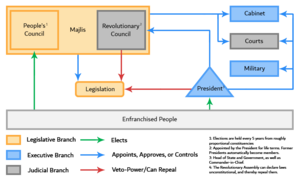Riadiya
This article is incomplete because it is pending further input from participants, or it is a work-in-progress by one author. Please comment on this article's talk page to share your input, comments and questions. Note: To contribute to this article, you may need to seek help from the author(s) of this page. |
Riadiyan Republic الجمهورية الريادية (Sahrabic) al-Jumhūrīyah ar-Riadīyah | |
|---|---|
|
Flag | |
| Capital and largest city | Azar |
| Official languages | Sahrabic |
| Demonym(s) | Riadiyan |
| Government | Unitary presidential constitutional republic |
| Yusuf Salman | |
| Legislature | Majlis |
| Revolutionary Council | |
| People's Council | |
• Density | 106.6/km2 (276.1/sq mi) |
| GDP (nominal) | 2018 estimate |
• Per capita | NS$17,044.17 |
| Gini | 42.7 medium |
| HDI | 0.787 high |
| Currency | Riadiyan Dinar (ݛ) (RDD) |
| Date format | dd/mm/yyyy |
| Driving side | right |
| Internet TLD | .rd |
Riadiya (/riːɑːdiːjə/ Sahrabic: رياديا Riadīya), officially known as the Riadiyan Republic (Sahrabic: الجمهورية الريادية al-Jumhūrīyah ar-Riadīyah), is a country located in...
Etymology
History
Geography
Government and politics
The Riadiyan government is composed of three branches:
- Legislative: The bicameral Majlis, made up of the Revolutionary Council and the People's Council, makes law.
- Executive: The President is the commander-in-chief of the military, can veto bills before they become law, and appoints the members of the Cabinet and other officers, who administer and enforce federal laws and policies.
- Judicial: The Supreme Court and appellate courts, whose judges are appointed by the President and the Majlis, and courts of first instance, elected by the communities in which they operate, interpret and apply the laws.
The People's Council is directly elected by the people of Riadiya. Elections use first-past-the-post and are held every five years in districts of similar population, which the President has the responsibility of apportioning. All bills originate in the People's Council, but the President may, in practice, also propose bills when a special session is called. Bills are passed by a simple majority.
The Revolutionary Council has the power to veto and, with the approval of the People's Council, amend legislation. Historically, the Revolutionary Council has had a broader purpose of revising bills passed by the People's Council, being an advisor to the People's Council through the process of creating legislation, and ensuring that legislation which passes adheres to the laws set forth in the Constitution and to the will of the people. While originally the Revolutionary Council was made up of high-profile revolutionaries from the Riadiyan Revolution, now it is generally made up of well-respected judges, scholars, and statesmen, many of whom have come out of retirement to take a position.
The President holds supreme executive authority as Riadiya's commander-in-chief. The President is also the chief diplomat, is responsible for organizing the census and apportioning the constituencies that elect the People's Council, can summon the Majlis or either of its houses to a special session, and call referenda to amend the Constitution. The President also holds some legislative power, with the de facto ability to propose bills and the power to veto bills which have passed the Majlis.
Parties
Law
Riadiya has a hybrid legal system, with characteristics deriving from both civil law and fiqh, and bears a resemblance to common law in practice.
There is a tiered system of courts, with the Supreme Court as the highest court. The Supreme Court and other appellate courts are appointed with the approval of the Majlis and the President, while courts of first instance are elected by local communities. Judges often come to decisions singlehandedly as courts use an inquisitorial system rather than an adversarial one, but appellate courts often consist of a panel of judges.
The Revolutionary Council acts primarily, in its judicial capacity, as Riadiya's constitutional court. The Revolutionary Council has the sole power to ensure adherence to the Constitution by the rest of the government, and so can nullify laws it deems unconstitutional or compel the government to fulfill its constitutional duties. It is not restricted to ruling on cases and conflicts and may issue legal opinions at any time.
The Revolutionary Council also has original jurisdiction in all cases involving members of the People's Council or the President and has the sole power to impeach members of the Majlis or the President.
Foreign relations
Military
Economy
Currency
Demographics
Ethnicity
Religion
Language
Culture
This template may be deleted.

